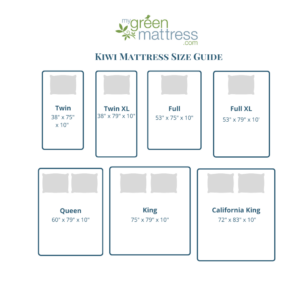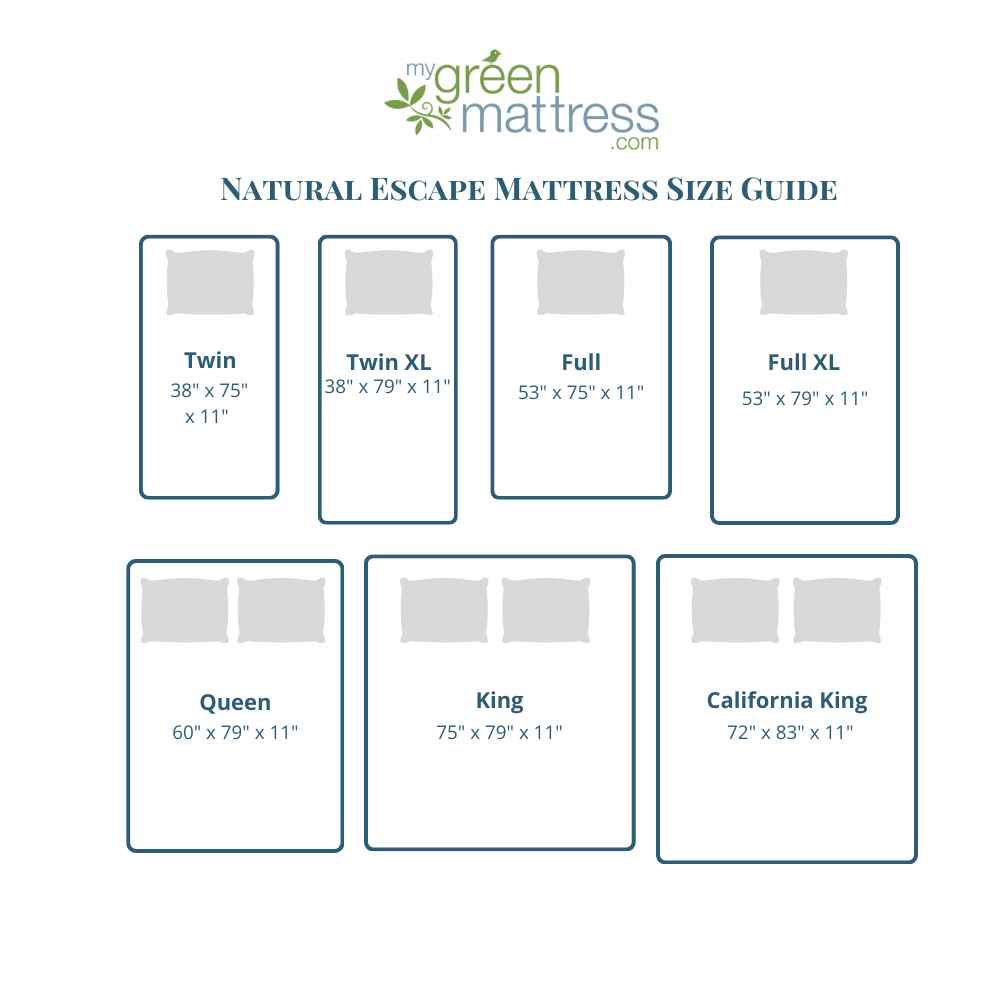Learning how to sleep better is one of the holy grails of modern culture. Sadly, over two thirds of American adults report getting poor sleep at least one night per month, and about one in 10 American adults share that they get poor sleep every night. That’s some serious sleep debt.
Thankfully, sleep is a personal health component that can be noticeably improved in just a few days with meaningful effort. There are both large and small characteristics of sleep that we cover in this blog post.
So, what are the most effective sleep habits that modern science has uncovered? Keep reading to discover 35 tips for sleeping better without sleep medicine or excessive trips to the doctor.
Sleep Better Daily with Our Hybrid Organic Mattresses

How to Get Better Sleep
To the modern working individual, getting quality sleep has often seemed elusive. In the United States where 83% of adults over the age of 21 work full-time, it can be difficult to make space for what matters most. The average American individual between the ages of 15 and 64 spends about two hours per day on housework and chores and another hour and a half on unpaid work, volunteering, or similar tasks.
Between all of those responsibilities, it’s no surprise that people find it difficult to sleep at night. What’s more, just getting seven to eight hours of sleep doesn’t mean that sleep was restful. Both sleep quality and quantity are essential.
Here are four actionable tips on how to get better sleep right away:
- Be honest about whether or not you’re ready to make lifestyle changes. Getting better sleep is priceless for optimal personal health, but that doesn’t mean lifestyle change is easy to make. It’s best to be honest with yourself and ensure you’re making lifestyle changes for your own reasons, not because you feel coerced into it by a family member, friend, or coworker. Evaluate what you feel ready to do right now and what can be addressed later.
- Do your favorite relaxing activity before sleeping. Bedtime is one time of the day that your mind should be free from the stressors of your week. If you’re worried about tomorrow or something even further out, chances are this is affecting your sleep. Pick an activity that will free you of any negative thoughts in the evening. Read a few chapters of a good book, spend a few minutes on a painting, make a light snack, or listen to some relaxing music.
- If you have a sleeping partner, discuss your goals with them. It’s one thing to change your sleeping habits when you live alone; it’s quite different when you’re living with a romantic partner or spouse. If your partner likes to stay up late, be honest about why you plan to change your schedule and the specific steps you’re taking. Anyone who loves and respects you will support your goals and possibly join you in them, too.
- Use comfortable pajamas. The clothing you sleep in should be comfortable, loose-fitting, and made of materials like cotton and linen. If you’re wearing athletic gear or any clothing that constricts any part of your body, it’s worth choosing different sleepwear. Science shows that tighter-fitting clothing raises your core body temperature and may restrict blood flow to parts of your body. When sleeping, you want blood flow to be as free as possible, which is necessary for your body to repair damaged or undernourished tissue.
As you can see, getting quality sleep is the result of both intentional choices and new habits. Sleeping better at night is also crucial if you’re looking to reach optimal levels of sleep health. Let’s look at a few ways to perfect your nightly sleep cycle.
How to Sleep Better at Night
If you’ve studied the circadian rhythm at all, you know that it’s the internal, bodily process that regulates your sleep-wake cycle every 24 hours. The human body processes sleep best at night, which is why it’s so important to optimize your nightly bedtime patterns.
Here are three methods for sleeping better at night:
- Orient your lifestyle around nighttime sleep. Perhaps you work a daytime job, but if you don’t, this section is for you. If you’re a nurse, warehouse employee, or another worker with irregular shifts, you may not be sleeping nights at all.
- Limit the number of days that you stay out past 11pm. Sleep researchers have found that individuals who consistently go to bed around or after midnight increase their risk of heart disease. What’s more, it’s a disruption of the circadian rhythm which gives preference to earlier bedtimes.
- Create as quiet a sleep environment as possible. Though some people are used to sleeping with white noise machines or fans on, this is usually the aftermath of bad childhood habits. White noise machines (or soundtracks) can make it easier to sleep in unusually loud environments like cities, buses, and planes, but they shouldn’t be relied upon for daily sleep. If you’re currently using a fan or white noise machine to fall asleep, try to wean yourself off of it day by day.
Now you have the basics of sleeping better at night down pat. If you’re into holistic methods for better sleep, too, you’re probably wondering about natural solutions for remarkable sleep. In the next section we’ll unpack this step by step.

How to Sleep Better at Night Naturally
Modern technology like alarm clock apps and sleep hygiene watches offer fun ways to learn more about your sleep patterns. However, these are better to supplement with after you’ve learned how to sleep better at night naturally.
Here are four proven strategies for naturally quality sleep that you can implement right away:
- Maintain a consistent sleep schedule. Going to bed and waking up around the same time each day is still the best sleep technique out there. This helps your circadian rhythm (body clock) maintain itself naturally, meaning it’s easier to feel tired when you’re supposed to feel tired.
- Limit naps to one or zero each day. Limiting your daytime napping is another simple way to sleep at night naturally. Napping during the day isn’t a complete risk, especially if it’s in the early afternoon (before 2pm). Anything after 2pm and you risk throwing off your body clock.
- Exercise vigorously on a regular basis. Sleep scientists have known for years that robust exercise contributes to sleeping better at night naturally. Vigorous physical activity releases endorphins, which limits the release of hormones like cortisol and adrenaline. The less cortisol flowing through your bloodstream, the easier it is to fall asleep at the right time.
- Avoid eating during the three hours before bed. It’s best to avoid eating before bed because your body will still be digesting that food. Forcing your body to process food during the only chance it gets to repair itself each 24 hour period puts a heavy burden on your system.
Sleeping better at night naturally is one of the best ways to get more restful sleep. But it’s difficult to reach that point if external factors like anxiety prevent you from getting the sleep you know you deserve. Next, we’ll look at safe methods for sleeping better with anxiety without formal help.
How to Sleep Better With Anxiety
If you’ve been diagnosed with anxiety, you’re even more familiar with how difficult it can be to fall asleep. Discovering how to sleep better with anxiety is similar to learning healthier sleep habits in general.
Here are five ways to sleep better with anxiety:
- Intentionally reserve time for winding down. Whether you’ve been medically diagnosed with anxiety or simply have racing thoughts, set aside time to wind down in the evening. This trains your mind to anticipate a period of calm before it’s time for shuteye. Often, the mind works in a placebo-effect manner, where you’ll legitimately feel calmer if you’ve allowed yourself the opportunity to.
- Keep a pre-sleep journal. If winding down isn’t quite enough, buy an inexpensive journal and spend five minutes writing down your thoughts before bed. You’ll be amazed at how much better you feel after getting your thoughts on paper.
- Consider meditation. Meditation is the practice of centering your mind on one thing at a time, or nothing at all. It usually involves sitting in the same position for at least a few minutes, eliminating distractions like the temptation of watching TV and noise, and focusing on the moment right in front of you. Once you’re seated in a comfortable position, close your eyes, breathe in deeply, and breathe out. Repeat this at least eight to 10 times and see how your mind responds.
- Limit your pre-bedtime screen usage. Going to bed isn’t always desirable, and many people stay up late using their phone, tablet, or computer. Unfortunately, late screen use inhibits your mind’s readiness to fall and stay asleep. Look at the time you’d normally go to bed and avoid using electronic devices at least one hour before then. This prepares your mind for its natural and necessary sleep cycle.
- Do a simple activity if you can’t sleep. Still can’t catch some Zs? Don’t worry. If you’re lying awake in bed with no sign of dreams in sight, get up and do something relaxing. Such activities include working on a puzzle, reading a book, or doing stretches. These calm activities slowly deplete your energy and leave you feeling more prepared for sleep than before.
If you aren’t struggling with anxiety but still want nourishing, deep sleep, we have you covered there too. Keep reading for our top recommendations on getting better sleep.

How to Get Better Deep Sleep
Getting your regular seven to nine hours of sleep per night is great as an adult. Once you reach that threshold, though, it’s time to focus on deep sleep.
Deep sleep is stage three of a healthy sleep cycle and getting enough of it is crucial for feeling rested upon waking. Here are four powerhouse tips on how to get better deep sleep:
- Minimize screen time for the four to five hours before you go to bed. Research demonstrates that blue light–which is emitted by cellphone and laptop screens–inhibits the production of melatonin. Your brain triggers melatonin production in response to darkness, which prepares your mind and body for sleep. Blue light is also the type of light that the sun emits, which is why your brain doesn’t think it’s time to sleep when you’re out in daylight. If you work on a computer late or otherwise must be utilizing an electronic device at night, use blue blocker glasses. These glasses minimize or eliminate the amount of blue light that reaches your eyes.
- Go to bed around the same time every night. Maintaining a consistent sleep schedule is conducive to deeper sleep and a core part of learning how to sleep better. Since your body relies on regular intervals of both REM and NREM sleep, drastic changes to your normal bedtime makes it harder for your mind to understand which sleep cycle it should be in. Aim to fall asleep within the same 30-minute window that you normally go to bed in.
- Keep your room as dark as possible. Think a small light in your bedroom won’t be an issue? Think again. Sleep research shows that a dark room helps both your body and mind relax. Bright lights signal to your mind that your body should be prepared for activity. When as much light is removed from your bedroom as possible, your brain has an easier time transitioning into sleep onset. Consider a sleep mask if you need to get used to sleeping in the dark at first.
- Keep your bedroom comfortably cool. If you’ve ever tried sleeping in a stuffy room, you know how difficult it is. A cooler bedroom environment assists your body with melatonin production and also keeps your core body temperature lower. The optimal sleep temperature is between 65 and 67 degrees Fahrenheit or about 18 to 19 degrees Celsius.
Now that you’re familiar with the best practices for getting deep sleep, your body will feel great when you wake up in the morning. Deep sleep is when your body undergoes tissue repair and cell replacement.
But deep sleep is only half of what you need for more restful sleep. REM sleep is necessary for your mind and promotes greater learning and memory development. Here’s more about strategies for better REM sleep.
How to Get Better REM Sleep
Rapid eye movement sleep, or REM sleep, is the fifth stage of sleep during a regular nightly sleep cycle. During REM sleep, the body undergoes rapid conjugate eye movements (both eyes moving left to right), limb twitching, and the activation of middle ear muscles. While dreams can occur during NREM and REM sleep, most people report their most frequent and vivid dreams occur during REM sleep.
All sleep cycle stages are essential, but REM sleep is particularly important for memory development and retention, proper brain development, and healthy processing of emotions.
Here are our top four recommendations on how to sleep better by getting better REM sleep:
- Avoid alcohol and caffeine before bed. Alcohol dehydrates you which is counterproductive to your body’s nighttime rejuvenation efforts. Caffeine is a stimulant and will be near impossible to fall asleep with if you’ve consumed any after 12pm. Both substances should be used sparingly in general.
- Cultivate and adhere to a relaxing pre-sleep routine. When bedtime is approaching, you should avoid anything physically demanding or mentally taxing. Such activities will only encourage the release of cortisol, which is one of the biggest stress hormones. Instead, use the time to get cozy in your favorite pajamas or have a sip of non-caffeinated tea. You’ll be ready to doze off in no time.
- Do something relaxing if you have trouble falling asleep. Can’t seem to count those sheep? Don’t stay in bed and hope it will get better. Step out of bed for a few minutes to walk around, or continue a book you’ve been reading. Your brain often needs to feel completely “at ease” before it will start shutting down for the night.
- Consider a magnesium supplement. Magnesium stimulates the Gamma-aminobutyric acid (GABA) receptors in your brain, and GABA is what’s responsible for regulating your REM sleep every night. If you’re waking up feeling cranky or inadequately rested, it’s likely because you haven’t gotten enough REM sleep.
Getting great REM and deep sleep is foundational for a lifetime of nourishing rest. Even with the habits and strategies you’ve learned so far, you may still be struggling to get on a good sleep schedule.
The time you go to bed and your regularity in achieving it is also crucial. Keep reading to learn how to optimize the most important elements of your sleep schedule.

How to Get On a Better Sleep Schedule
It’s essential to have a consistent sleep schedule, which is an activity you spend one third of your life doing. Given how busy many adults are these days, it’s no wonder that getting on a fantastic sleep schedule is a coveted thought.
Anything is possible with personal willingness and follow-through. Here are three recommendations for how to get on a better sleep schedule:
- Assess your current schedule and look for what you can change. 50% of Americans say they don’t believe they have enough time to finish their tasks every day. That’s a lot of time dedicated to simply keeping one’s life afloat. Do you see anything you can modify or eliminate in your typical week? Are there chores you can delegate, bad habits you can work to cut out, or a service you can automate? Chances are you can answer yes to at least one of these. That’s likely one or two hours you can rededicate to more sleep.
- Eliminate late evening distractions. Tend to get home from work late? Don’t make any plans for weeknights. Find yourself doing a lot of prep work for the next day late at night? Do it during the morning or afternoon so you aren’t scrambling in the evening. Any task you can complete earlier frees up your evening to focus on winding down for the day. This is an often-overlooked but important part of embracing how to sleep better.
- Strive to wake up at the same time most days. Most people like to sleep in on days that they’re able, which is completely understandable. That being said, waking up at different times on most days is counterproductive to a regular sleep schedule. No matter what your day-to-day obligations look like, find a time that you can consistently wake up. Set your alarm for this time, and after a couple weeks you’ll naturally start to wake up feeling more refreshed.
You’ve adopted essential sleep habits, learned the difference between deep and REM sleep, and even fine-tuned your own sleep schedule. But what if you or your partner is pregnant? We have you covered on that, too.
As you can imagine, sleeping soundly when pregnant is a little different from sleeping without carrying a baby. Let’s take a closer look.
How to Sleep Better When Pregnant
Learning how to sleep better pregnant doesn’t have to be rocket science. That being said, it’s wise to prepare so you have all of the mental and physical support systems you need.
Here are four great ways to sleep better when pregnant:
- Use a mattress with top-tier lumbar support. We’ve designed all of our products to offer the best lumbar support possible in a mattress. My Green Mattresses’ lumbar zones have springs placed closer together with higher coil counts than other sections of our mattresses.
- Maintain your normal exercise schedule. Staying physically active helps people stay asleep in general, so remaining active while pregnant definitely helps. Good exercises for pregnancy include swimming, walking, riding a stationary bike, and lower-intensity strength training.
- Experiment with soothing scents. If you have a favorite calming scent or essential oil, consider turning on your diffuser for a couple hours before bed. This can help you feel relaxed during an otherwise stressful time of life.
- Practice relaxation techniques. Mentally preparing yourself for sleep helps your body relax, too. One of the best ways to do this is slowly breathing in and out for at least five minutes. Not only will this help you breathe fuller air, it will signal to your major muscle groups that they can relax. If you find that you’re waking up groggy, make sure you don’t have sleep apnea. This is a serious condition that can lead to other issues if left unchecked.
Strategies to sleep better while pregnant is useful for those who need it. If you aren’t pregnant but still want to know what the best kind of sleeping posture is, you’re about to have all the answers. Next up are a few insights on the right posture for better sleep.

How to Sleep for Better Posture
Attaining and maintaining great sleep posture is one of the most underrated aspects of sleep hygiene. It’s easy to fall asleep if you’ve had good sleep posture for years, but if it’s your first time reading about it, there are important things to know.
Improve your sleep posture while learning how to sleep better with these four strategies:
- Sleep on your back when possible. Most sleep experts recommend sleeping on your back if you can. For most people at most stages of life, this is a comfortable and natural sleeping position. If you find yourself sleeping on your stomach, ask yourself if it’s preferential or caused by something serious. If you’re in pain sleeping on your back, talk with your doctor or a chiropractor to learn what the cause may be.
- Use the right kind of pillow. Whether your body feels supported as you’re falling asleep depends mostly on your pillow. In earlier years, many people considered a large, fluffy pillow to be the best. Ongoing sleep and anatomical research shows that a pillow that fills the gap between your neck and your bed is the right choice. This means your pillow needs to be dense enough to support your neck and head, but low enough to still feel comfortable. Consider your current pillow and whether or not it meets these recommendations.
- Use a thicker pillow if you’re a side sleeper. If you sleep on your side, which 54 to 59% of American adults do (YouGov), you’ll need a thicker pillow than normal. Laying on your side creates a greater space between your shoulder/the side of your neck and the bed. Our charcoal-infused organic latex pillow is the perfect solution!
- Use comfortable, clean sheets. Bedsheets alone won’t improve your posture, but if you sleep in clean, high quality sheets, you’ll fall asleep more easily. The more easily you can fall asleep, the more likely you are to stay asleep with good posture.

Frequently Asked Questions About Sleeping Better
Having read this blog post, you’re more educated on proper sleep habits than the average American consumer. But you may still have questions about how to sleep better, and that is totally understandable.
We looked up a few of the most frequently asked questions about sleeping better. Check out our answers below:
What Are 10 Tips to Improve Sleep?
If you want 10 easy-to-implement tips that will improve your sleep, here are our best recommendations:
- Exercise vigorously at least two or three times per week.
- Sleep in a completely dark room.
- Don’t eat for the three hours before bed.
- Sleep in comfortable pajamas made of natural materials.
- Avoid white noise machines whenever possible.
- Go to sleep and wake up around the same time each day.
- Engage in a pre-bedtime routine to wind down.
- Use a mattress that supports your entire body.
- Keep your bedroom between 65 and 67 degrees Fahrenheit (18 to 19 degrees Celsius).
- Stretch large muscle groups to get more relaxed, like your back, legs, and arms.
Is 5 Hours of Sleep Enough?
No, five hours of sleep is not enough for regular nightly sleep. If you’re only getting five hours of sleep per night on a regular basis, you’ll experience sleep deprivation. Sleep deprivation includes worsened cognitive function, impaired memory, and preventable mood fluctuations.
Sleep scientists and experts recommend between seven to nine hours of sleep per night for adults, eight to 10 hours per night for teenagers, and 10 to 12 hours per night for school-aged children. If you are getting the recommended amount of sleep for your age range or aren’t sure how much you should be getting each night, speak with a sleep specialist to learn more.
What to Drink to Sleep Faster?
If you like an evening beverage a few hours before sleeping, there are several drinks that can help you doze off. Here are some of the best:
- Non-caffeinated tea. A warm beverage like tea sets the body at ease and caffeine-free options ensure you can fall asleep at the right time. Many people report experiencing an easier time falling asleep with chamomile tea in particular.
- Coconut water. Coconut water hasn’t historically been known as a sleep-inducing beverage, but it’s actually one of the better drinks to have before bed. This beverage is rich in potassium, which helps relax muscles, and magnesium, which helps your body regulate REM sleep.
- Warmed milk. If you aren’t allergic to dairy and you don’t like tea or coconut water, warm milk is another option. Milk contains tryptophan, which is an amino acid that causes tiredness upon digestion.
Regardless of which beverage you choose, make sure you only consume a little bit. Consuming more than a few ounces puts you at risk of needing to wake up in the middle of the night or experiencing indigestion.

What Is the 4 7 8 Sleep Trick?
The 4 7 8 sleep trick is a simple breathwork technique that helps you fall asleep easier. Here’s how to do it:
- First, close your mouth and inhale through your nose for a count of four.
- Second, hold your breath for a count of seven.
- Third, exhale through your mouth for a count of eight.
- Fourth, optionally repeat this entire cycle four or five times.
By the end of this process, you’ll feel more at ease and your mind will be more prepared to sleep.
What Are 3 Techniques to Try to Sleep Better?
If you have a busy schedule or a lot of responsibilities, but still want to sleep better, have no fear. Here are three techniques to sleep better:
- Create a consistent sleep schedule and stick to it. Just like many other aspects of life, being consistent with your input leads to good results. The more frequently you go to bed at the same time, the more solidified your circadian rhythm becomes.
- Avoid electronics before bed. By all means strive not to use electronics before going to bed. If you have to use screen-based devices up until the point you go to bed, use blue-blocking glasses to help your mind remember it’s almost time to go to bed.
- Avoid any strenuous activities, mental or physical, right before bed. Sleep is a time for your body and mind to be rejuvenated. If you’re stressed about anything right before bedtime, your mind will be primed to solve the problem, not lay it aside. Strive to tackle pressing life matters no later than 8pm, which gives you about two to three hours to mentally wind down.
A Better Mattress for Better Sleep
Now that you’ve learned how to sleep better–and over two dozen tips, to be exact–you need the right sleep suppliers. We make top-notch organic mattresses so you can get the best sleep of your life, starting now. Shop our products today!













